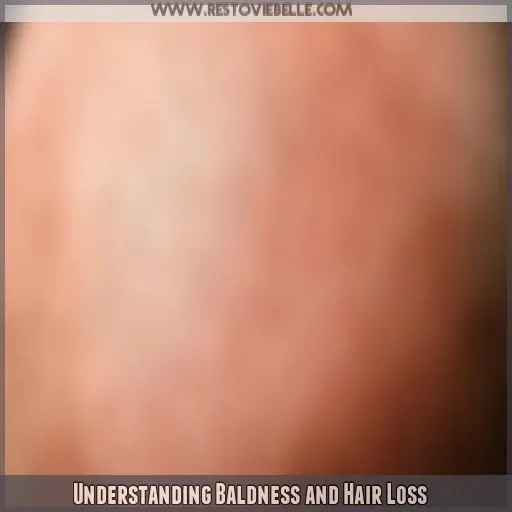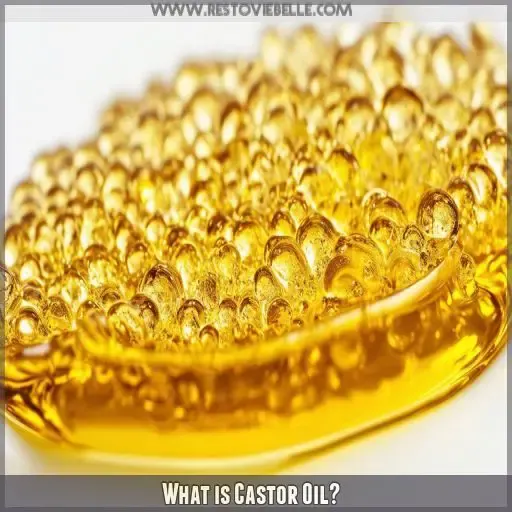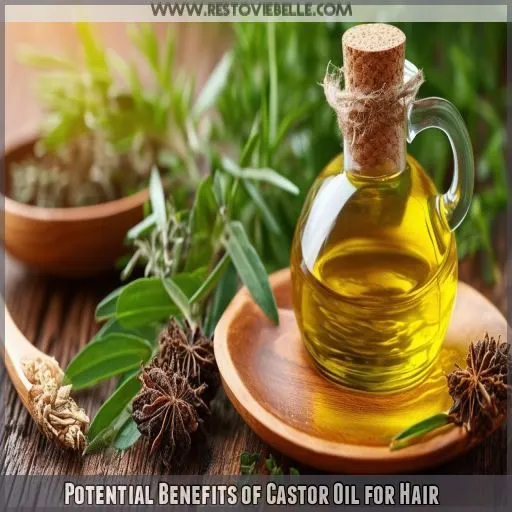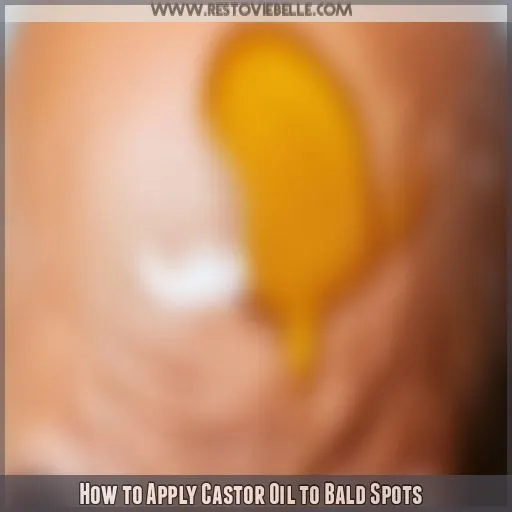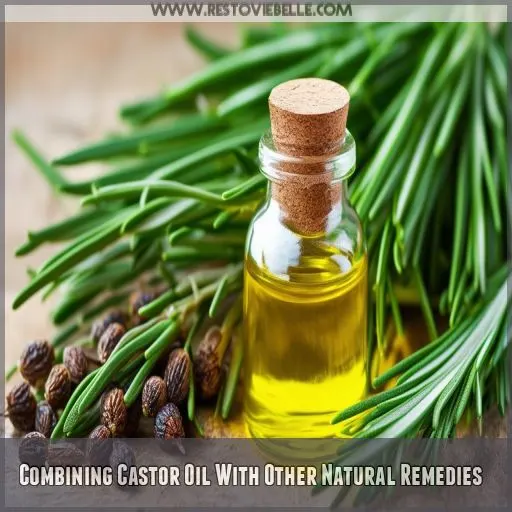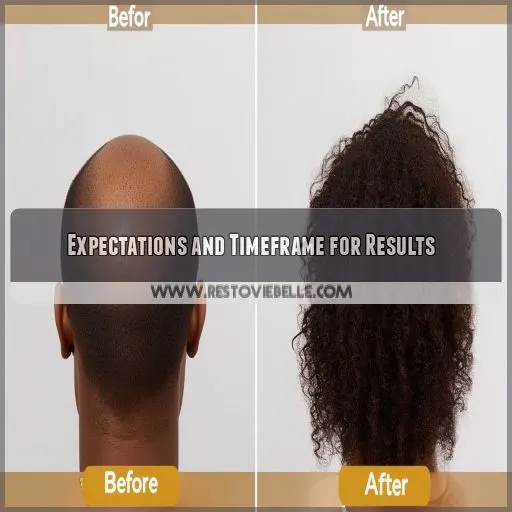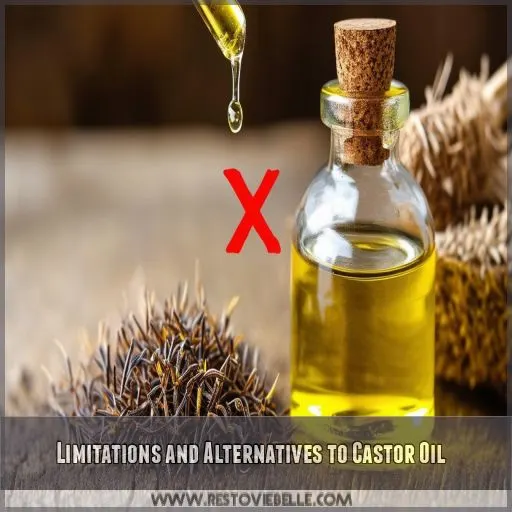This site is supported by our readers. We may earn a commission, at no cost to you, if you purchase through links.
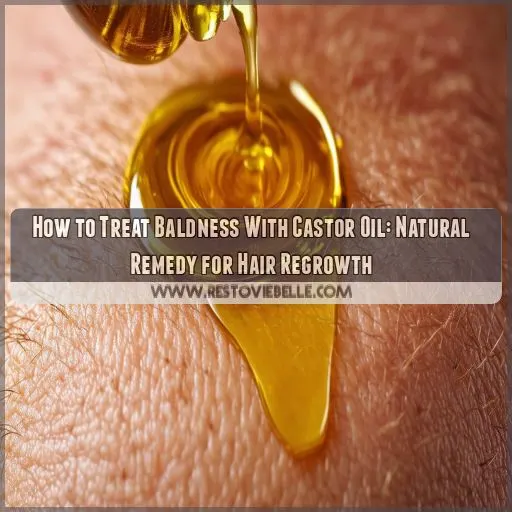 Like Rapunzel’s legendary locks, your quest for hair regrowth can bring you back to natural remedies. The fame of castor oil as a solution to baldness is well-known due to its widespread use.
Like Rapunzel’s legendary locks, your quest for hair regrowth can bring you back to natural remedies. The fame of castor oil as a solution to baldness is well-known due to its widespread use.
You are about to become familiar with treating baldness using castor oil—a natural remedy for hair regrowth. We will examine its composition, benefits, and application techniques, empowering you with knowledge that may potentially revitalize your scalp.
While not a magic bullet, castor oil is an exciting new approach to addressing hair loss and improving scalp health.
Table Of Contents
- Key Takeaways
- How to Treat Baldness With Castor Oil?
- Understanding Baldness and Hair Loss
- What is Castor Oil?
- Potential Benefits of Castor Oil for Hair
- How to Apply Castor Oil to Bald Spots
- Combining Castor Oil With Other Natural Remedies
- Expectations and Timeframe for Results
- Limitations and Alternatives to Castor Oil
- Frequently Asked Questions (FAQs)
- Can castor oil regrow hair on a bald head?
- How long does it take for castor oil to regrow hair?
- Is castor oil better than Minoxidil?
- How to grow back edges with castor oil?
- Does castor oil help with hair loss?
- What is the treatment for hair line edges with castor oil?
- How to use castor oil on hair?
- Is castor oil good for your scalp?
- Can you use castor oil on curly hair?
- Can we use castor oil for hair daily?
- How does castor oil stimulate hair growth?
- Can castor oil regrow hair on completely bald areas?
- Is jamaican black castor oil more effective than regular?
- How often should I wash hair after applying?
- Are there any side effects of long-term use?
- Can castor oil prevent future hair loss?
- Conclusion
Key Takeaways
- Castor oil isn’t a magic bullet for baldness, but it might be your scalp’s new best friend. Its moisturizing and anti-inflammatory properties could give your hair follicles a much-needed spa day.
- Patience is key when using castor oil – Rome wasn’t built in a day, and your luscious locks won’t be either. Consistent application over weeks or months might yield results, but don’t expect to wake up looking like Rapunzel overnight.
- Mix it up! Blending castor oil with essential oils or herbs could supercharge your hair care routine. Just remember, your scalp isn’t a science experiment, so patch test before going all in.
- When in doubt, seek a pro. If your hair loss is more stubborn than a mule, it might be time to chat with a dermatologist about FDA-approved treatments. After all, sometimes you need to bring out the big guns when battling baldness.
How to Treat Baldness With Castor Oil?
For baldness, clean your scalp and apply good-quality pure castor oil, cold-pressed, only to the affected areas. Massage gently with your fingertips in a circular motion for 5-10 minutes. Let it stay on your scalp for 30 minutes or overnight, then wash it off.
Do this 2 to 3 times a week, but be careful not to overdo it as it builds up. Nourishing your scalp health with castor oil promotes hair growth, though results are variable and can take months.
It works best on temporary hair loss or thinning, not permanent baldness. Be reminded also that this all-natural remedy requires much patience.
More comprehensive solutions call for supplementary exploration.
Understanding Baldness and Hair Loss
You may experience various types of hair loss, including male or female pattern baldness, alopecia areata, and telogen effluvium. Common causes of baldness include genetics, hormonal changes, medical conditions, and certain medications, which can affect your hair growth cycle and follicle health.
Types of Hair Loss
Understanding hair loss means knowing the different types. You’ll find several forms of alopecia, each of which affects your hair differently:
- Androgenetic alopecia: Male pattern and female pattern hair loss
- Alopecia areata: Circular hair loss over the scalp or body
- Traction alopecia: Baldness due to continual tugging or pulling.
Common Causes of Baldness
Now that you’re conversant with different types of hair loss, let’s delve into the common causes of baldness. Your genes play a significant role but aren’t the only ones to be blamed for.
Poor nutrition, stress, and some life choices can cause you to lose some hair. Changes in hormone levels, some medical conditions, and some medications may also result in thinning hair or baldness.
While little can be done about genetics, the rest can be worked on through prevention about a good diet, management of stress, and proper hair care.
All these causes come into play when considering treatments like castor oil or other hair loss remedies for your scalp health.
What is Castor Oil?
Castor oil is a vegetable oil derived from the seeds of the Ricinus communis plant, primarily composed of ricinoleic acid and other fatty acids. Throughout history, it has been used for various purposes, including hair care, due to its moisturizing properties and potential benefits for scalp health.
Composition and Properties
Now that you know something about hair loss, let’s talk about the constituents of castor oil. This is a natural extract derived from castor beans following a tedious process. It comprises ricinoleic acid, a special kind of fatty acid that might help grow hair. It also includes vitamin E, which is very common for moisturizing. Even so, though relatively safe, its toxicity should be considered if taken in massive amounts internally.
Here’s why castor oil is increasingly in demand for hair care:
*Nutrients packed that may nourish your scalp
• Its moisturizing effect may reduce hair breakage.
• Has anti-inflammatory properties that can promote a cleaner and more healthy scalp.
Historical Uses for Hair Care
You’ve learned about castor oil’s composition, but did you know its hair care history spans millennia? Ancient civilizations revered this versatile oil for its nourishing properties. Here’s a glimpse into castor oil’s rich past:
| Era | Culture | Hair Care Use |
|---|---|---|
| 4000 BCE | Ancient Egypt | Scalp treatment |
| 1500 BCE | Ayurveda | Hair growth tonic |
| 500 BCE | Ancient Greece | Hair strengthening |
| 1st century CE | Roman Empire | Baldness remedy |
From Cleopatra’s luxurious locks to Ayurvedic hair care rituals, castor oil has been a go-to treatment for generations. Its enduring popularity in traditional beauty practices might just hold the key to treating modern baldness naturally.
Potential Benefits of Castor Oil for Hair
Castor oil’s potential benefits for hair include its moisturizing effects, anti-inflammatory properties, and ability to improve scalp health. These qualities may help nourish hair follicles, reduce inflammation that can contribute to hair loss, and create a healthier environment for hair growth.
Moisturizing Effects
Castor oil’s moisturizing prowess can transform your hair and scalp care routine. Its rich composition nourishes hair follicles, potentially boosting their health. By penetrating deep into the scalp, it helps combat dryness and flakiness. This natural remedy’s antioxidant content may also protect your hair from environmental damage. You’ll love how it leaves your locks feeling soft and manageable.
Anti-inflammatory Properties
Castor oil’s moisturizing effects aren’t its only benefit for your hair. Its anti-inflammatory properties make it a promising topical treatment for various scalp issues. When applied, castor oil may help soothe irritation and reduce inflammation around hair follicles. This can potentially alleviate conditions like dandruff and create a healthier environment for hair growth. Remember, though, that individual results may vary.
Scalp Health Improvement
Other than its anti-inflammatory properties, castor oil can also augment the health of your scalp—the antimicrobial benefits help fight scalp irritation and thus reduce dandruff. The unique formation of the oil may work magic on increasing blood flow and stimulating the hair follicles. Here is how castor oil can improve your scalp’s health:
- Balances pH of the scalp
- Moisturizes dry, scaly skin
- Fights Fungal Infection
Regular application could lead to a healthier environment for hair growth.
How to Apply Castor Oil to Bald Spots
To apply castor oil to bald spots, you’ll need to properly prepare your scalp and use the right application techniques. It’s important to establish a consistent routine and apply the oil with the correct frequency for the best chance of seeing potential benefits.
Preparation Steps
Massage castor oil into your bald spots, but first, get your scalp ready for the best absorption. Start with clean, dry hair.
Look for high-quality, cold-pressed castor oil. Store your product in a cool and dark place to preserve its content.
Always conduct a patch test to use it safely.
Take some pictures before you start treating so you can monitor your progress.
Application Techniques
Now that you’re prepared, let’s apply castor oil effectively:
- Gently massage a small amount of oil into your scalp, focusing on bald spots.
- Use circular motions to stimulate blood flow and hair follicles.
- Leave the oil on for at least 30 minutes, or overnight for deeper penetration.
Frequency of Use
Use castor oil in your bald spots 2-3 times weekly for optimum results. Massage lightly into your scalp to promote blood flow. Let it sit overnight like a hair mask, and let the essential nutrients sink in.
Don’t overdo it, though; excessive use may cause buildup. The key is consistency, but patience is everything.
Natural remedies take time.
Combining Castor Oil With Other Natural Remedies
You can enhance castor oil’s potential benefits for hair regrowth by combining it with other natural remedies. Essential oil blends and herbal infusions can be mixed with castor oil to create customized treatments that may target specific hair and scalp concerns.
Essential Oil Blends
Take the advantages of castor oil to the next level by mixing it with some essential oils. Blend castor oil as a carrier with rosemary, peppermint, or lavender for that extra kick.
Of course, if using essential oils, safety has to be paramount. Always dilute them properly in carriers. Formulate blends meant for specific hair types: tea tree for oily scalps, or perhaps chamomile for sensitive skin.
Bottle mixtures into dark glass bottles to keep their potency locked in. Massage gently into the scalp on application, using gentle techniques to enhance circulation and absorption. Massage in circular motions at the base of your skull, working your way forward.
This combination of oils, along with massage, may elevate your efforts for hair regrowth.
Herbal Infusions
You can also mix herbs known to enhance your hair in castor oil. Take rosemary, nettle, or saw palmetto and infuse it in castor oil for weeks. Herbal variations of castor oil would then add its benefits.
However, be warned that while such herbal mixtures are famous, their efficacy isn’t proven by science.
Always take precautions while using castor oil: carry out a patch test and consult your doctor before use if you have overly sensitive skin or allergies.
While looking into natural remedies might be exciting, one must always maintain realistic expectations of their impact on baldness and hair regrowth.
Expectations and Timeframe for Results
When using castor oil for baldness treatment, it’s important to set realistic expectations and understand that results can vary greatly among individuals. Factors such as the underlying cause of hair loss, consistency of application, and overall scalp health can all influence the effectiveness and timeline for potential improvements in hair growth.
Realistic Outcomes
If you’re treating baldness with castor oil, then you need to be patient about the results. Anecdotal evidence does incline toward proving some potential benefits, but clinical studies haven’t yet demonstrated it to be effective for growing back hair.
You can feel changes in the scalp’s health and hair texture after a few weeks, but significant hair regrowth may take months—if it occurs at all. Remember, results vary widely among individuals. There are some cases where the regular application of castor oil to the hair can lead to thicker, fuller hair; for others, this changes minimally.
It’s essential to approach castor oil as complementary medicine rather than looking for the holy grail. That’s the watchword: one exercises patience and persistence in working with natural remedies against hair loss.
Factors Affecting Effectiveness
While realistic outcomes are to be expected, several factors can still influence the effectiveness of castor oil in growing your hair back. Your present hair condition, the cause of baldness, and the consistency of application matter much. Dosage of castor oil also applies—too little won’t work, and too much invites buildup.
Application to the exterior area is relatively safe compared to consumption. The diet you intake, the stress in your life, and other health conditions promote healthy hair growth.
Remember that castor oil is no magic remedy. It’s a component of your hair care regimen. So, be patient and combine it with holistic therapy for the best results.
Limitations and Alternatives to Castor Oil
While castor oil may offer some benefits for hair health, it’s not a proven treatment for baldness. If you’re experiencing significant hair loss, it’s important to consult a medical professional who can recommend FDA-approved treatments like finasteride or minoxidil, which have been clinically shown to be effective for many people.
When to Seek Medical Advice
Though castor oil can be helpful, one should know when to seek help from a professional doctor. Immediately withdraw its application and consult your doctor if you show an allergic reaction or continuous irritation on your scalp. Always test castor oil on your skin through a patch test before massaging it into your scalp.
Most importantly, castor oil isn’t the magic solution to cure baldness. If you aren’t seeing results, or if your hair loss is severe, then it’s time to talk with a doctor. They can help identify underlying causes and suggest more effective treatments tailored to your situation.
FDA-Approved Treatments for Hair Loss
While castor oil offers a natural approach, FDA-approved treatments provide proven results for hair loss. Minoxidil, available over-the-counter, stimulates hair growth and slows balding. Finasteride, a prescription medication, blocks hormones linked to hair loss.
However, be aware of potential side effects and allergic reactions. Consult your doctor about safety precautions and drug interactions before starting any treatment.
These options may be more effective than castor oil, but they’re not without risks. Consider alternative therapies like low-level laser therapy or platelet-rich plasma injections if you’re seeking other science-backed solutions.
Frequently Asked Questions (FAQs)
Can castor oil regrow hair on a bald head?
While castor oil may nourish your scalp, it can’t regrow hair on a bald head. There’s no scientific evidence supporting its ability to reverse baldness. For proven treatments, consult a dermatologist or hair specialist about FDA-approved options.
How long does it take for castor oil to regrow hair?
There’s no scientific evidence that castor oil regrows hair. While it may moisturize your scalp and potentially improve hair health, it won’t cure baldness. For proven hair regrowth treatments, consult a dermatologist or trichologist for personalized options.
Is castor oil better than Minoxidil?
Minoxidil’s clinically proven for hair regrowth, while castor oil lacks scientific backing. You’re better off sticking with FDA-approved treatments like Minoxidil. It’s more effective and reliable for combating hair loss, though results vary between individuals.
How to grow back edges with castor oil?
To grow back edges with castor oil, apply it to your hairline nightly. Gently massage it in, focusing on thinning areas. While there’s no scientific proof, some find it helpful. Consistency’s key, but don’t expect miracles overnight.
Does castor oil help with hair loss?
While castor oil’s moisturizing properties may benefit your scalp and hair, there’s no scientific evidence it can treat hair loss. It won’t cure baldness, but it might improve overall hair health. Consider FDA-approved treatments for more effective results.
What is the treatment for hair line edges with castor oil?
To treat hairline edges with castor oil, apply it directly to the affected area. Gently massage it into your scalp using circular motions. Leave it on overnight, then wash it out in the morning. Repeat this process regularly for potential benefits.
How to use castor oil on hair?
Like a hair-reviving elixir, castor oil’s your ally. Section your mane, don gloves, and massage it into your scalp. Wrap your head and let it work overnight. Rinse thoroughly in the morning. Repeat weekly for potential benefits.
Is castor oil good for your scalp?
Castor oil can benefit your scalp. It’s moisturizing, anti-inflammatory, and may reduce dandruff. While it won’t cure baldness, it can improve scalp health. Apply it regularly, but do a patch test first to avoid potential reactions.
Can you use castor oil on curly hair?
Like a gentle breeze caressing curls, castor oil can be a boon for your spirals. You can use it on curly hair to moisturize, reduce frizz, and promote scalp health. Apply sparingly to avoid weighing down your luscious locks.
Can we use castor oil for hair daily?
You can use castor oil daily, but it’s not necessary. Applying it 2-3 times a week is usually sufficient. Remember to wash it out thoroughly to avoid buildup, which could lead to scalp issues.
How does castor oil stimulate hair growth?
Imagine your scalp as a parched garden. Castor oil’s ricinoleic acid acts like a gentle rain, potentially nourishing follicles and improving blood flow. While it’s not a proven cure, some believe it may encourage hair growth. More research is needed.
Can castor oil regrow hair on completely bald areas?
Unfortunately, there’s no scientific evidence that castor oil can regrow hair on completely bald areas. While it may benefit existing hair, it can’t create new follicles. For proven treatments, consult a dermatologist or hair specialist.
Is jamaican black castor oil more effective than regular?
Jamaican jelly: just another jar? While some swear by its supposed superiority, scientific studies don’t support significant differences. You’re better off focusing on clinically proven treatments. If you’re keen on castor oil, either variety can work similarly.
How often should I wash hair after applying?
You don’t need to wash your hair immediately after applying castor oil. Leave it on for at least 2-3 hours, or overnight for deeper conditioning. Wash your hair every 2-3 days to maintain its natural oils.
Are there any side effects of long-term use?
Whoa, Nelly! Long-term castor oil use can lead to scalp irritation and clogged pores. You might experience allergic reactions or hair buildup. It’s not a proven baldness treatment, so consult a doctor for safer, evidence-based options.
Can castor oil prevent future hair loss?
While castor oil’s moisturizing properties may benefit your scalp, there’s no scientific evidence it can prevent future hair loss. For proven prevention methods, you’d be better off exploring FDA-approved treatments or consulting a hair specialist.
Conclusion
Treating baldness with castor oil offers a tantalizing glimpse into natural hair regrowth solutions. While it’s not a miracle cure, this age-old remedy may provide hope for those struggling with hair loss.
If you don’t see improvements after a few months, consider consulting a dermatologist for alternative treatments.
Ultimately, your journey to combat baldness with castor oil is a personal one, guided by science and nurtured by nature.

